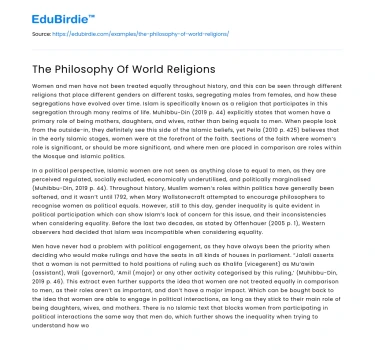Women and men have not been treated equally throughout history, and this can be seen through different religions that place different genders on different tasks, segregating males from females, and how these segregations have evolved over time. Islam is specifically known as a religion that participates in this segregation through many realms of life. Muhibbu-Din (2019 p. 44) explicitly states that women have a primary role of being mothers, daughters, and wives, rather than being equals to men. When people look from the outside-in, they definitely see this side of the Islamic beliefs, yet Peila (2010 p. 425) believes that in the early Islamic stages, women were at the forefront of the faith. Sections of the faith where women’s role is significant, or should be more significant, and where men are placed in comparison are roles within the Mosque and Islamic politics.
In a political perspective, Islamic women are not seen as anything close to equal to men, as they are perceived regulated, socially excluded, economically underutilised, and politically marginalised (Muhibbu-Din, 2019 p. 44). Throughout history, Muslim women’s roles within politics have generally been softened, and it wasn’t until 1792, when Mary Wollstonecraft attempted to encourage philosophers to recognise women as political equals. However, still to this day, gender inequality is quite evident in political participation which can show Islam’s lack of concern for this issue, and their inconsistencies when considering equality. Before the last two decades, as stated by Offenhauer (2005 p. 1), Western observers had decided that Islam was incompatible when considering equality.
Save your time!
We can take care of your essay
- Proper editing and formatting
- Free revision, title page, and bibliography
- Flexible prices and money-back guarantee
Men have never had a problem with political engagement, as they have always been the priority when deciding who would make rulings and have the seats in all kinds of houses in parliament. “Jalali asserts that a woman is not permitted to hold positions of ruling such as Khalifa (vicegerent) as Mu’awin (assistant), Wali (governor0, ‘Amil (major) or any other activity categorised by this ruling,’ (Muhibbu-Din, 2019 p. 46). This extract even further supports the idea that women are not treated equally in comparison to men, as their roles aren’t as important, and don’t have a major impact. Which can be bought back to the idea that women are able to engage in political interactions, as long as they stick to their main role of being daughters, wives, and mothers. There is no Islamic text that blocks women from participating in political interactions the same way that men do, which further shows the inequality when trying to understand how women are placed in comparison to men.






 Stuck on your essay?
Stuck on your essay?

